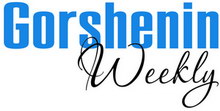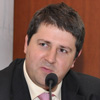
Court to declare verdict in Yuliya Tymoshenko case on 11 October 2011 
(2 Mb)

ISSUE #33
10/03/2011
On 11 October 2011 a Kiev district court will start to read the verdict
regarding the leader of the opposition Fatherland party and former Ukrainian
Prime Minister Yuliya Tymoshenko.
A correspondent of the Ukrainian news and analysis website Lb.ua reported that
that court debates in Tymoshenko's case were completed on 30 September 2011. It
was expected that Tymoshenko would deliver a concluding speech in the court on
the same day. However, the former prime minister requested her address to be
rescheduled for 2 October 2011. She explained her demand by the fact that prior to
her speech, the prosecutor's office and civil plaintiff had unveiled fresh “aspects
that totally differ from the indictment.” READ MORE
- Gorshenin Weekly |
Published on EGF: 22.10.2011
| External Relations
-
Professor Andrej Kreutz, EGF expert on trans-Atlantic security, reviews the recent webcast of Russian Deputy Foreign Minister, Denisov, Andrei Ivanovich Russian Deputy Foreign Minister, Andrei Ivanovich Denisov, likes to see the world in a dialectical way, perceiving the linkage of its social and political developments. According to him, the present historical period, which began after the outbreak of the recent global crisis in 2009, is a time of upheavals and subsequent instability. Consequently, the role of diplomacy now is to minimize the possible negative impact of political instability taking place at the global level and to look for less conflict-ridden international relations.
READ MORE
- Andrej Kreutz |
Published on EGF: 17.10.2011
| External Relations
-
EGF Turkey File 
(100 Kb)
Insights into Turkish Domestic and International Politics during September 2011
Key developments:
- Turkish Prime Minister Erdogan’s September is filled with tumultuous foreign policy issues, coalescing
disputes with Israel, Cyprus and the world’s stance towards Somalia in his statement to the UN General
Assembly.
- The prime minister visited Libya, Egypt and Tunisia in a quick tour of countries touched by the Arab Spring
while continuing his condemnation of Syrian repression of civilians and rebuffing Iranian and Russian anger
at Ankara’s participation in NATO’s missile shield.
- Kurdish-related violence seizes the country through terrorist attacks and military operations between PKK
fighters and the Turkish military. BDP Kurdish Peace and Democracy Party parliamentary deputies end their
boycott of the parliament in order to end the hostilities.
- The European Commission instigates raids on Gazprom subsidiaries on suspected competition violations, with
many calling it a political move to garner support for Nabucco and undermine South Stream and Nord
Stream.
- Energy major BP announces a planned pipeline from the Shah Deniz II field in Azerbaijan traversing Turkey,
Romania, Bulgaria and Hungary.
READ MORE
- EGF Editorial |
Published on EGF: 12.10.2011
| Energy
-
EGF Gazprom Monitor 
(123 Kb)
Issue 8: August-September 2011
A Snapshot of Key Developments in the External Relations of the Russian Gas Sector
Key points:
- Gazprom partners raided by European Commission Anti-trust Inspectors
- The dispute between Moscow and Kiev continues. Ukraine knows that it has a weak bargaining position and
is in no hurry to make concessions to Russia
- Prime Minister Vladimir Putin launched the first string of Nord Stream, meaning Ukraine is now in danger of
losing its status as the main transit country for Russia’s European gas exports
- Gazprom has signed roadmap with South Korea's Kogas for the construction of a pipeline from Vladivostok to
South Korea
- Gazprom may suspend its project in Nigeria because of the lack of a law governing the oil and gas industry,
although experts say Gazprom may have lost interest in this project because of potential difficulties in selling
Nigerian gas
- Gazprom is looking to acquire two state-owned oil and gas companies in Kyrgyzstan
- The Gazprom affiliate Vemex has acquired a 51% stake in RSP Energy, marking the first time a Gazprom
Group company will sell gas and electricity to Czech households
- Gazprom has signed a legally-binding agreement with its European partners on the implementation of the
South Stream project, but has attracted criticism from the EU. According to Russian sources, EU Energy
Commissioner, Guenther Oettinger, views South Stream as an attempt by Moscow to derail the ‘Southern
Corridor’ gas supply diversification concept
- In line with new oil production projects in the region, Gazprom Neft is considering the construction of a new
oil refinery near Murmansk
- Gazprom expects a doubling of the Mineral Extraction Tax by 2013.
READ MORE
- EGF Editorial |
Published on EGF: 12.10.2011
| Energy
-
As Eastern Mediterranean’s Waters Heat Up, Turkey Should Lead An OSCE-Type Initiative In The Middle East 
(125 Kb)
 by Mehmet
Ogutcu,
by Mehmet
Ogutcu,
Expert in global energy security matters
The Turkish leadership has committed itself to a tough position on Israel, Cyprus and Syria, and any backtracking or sign of weakness will seriously affect its credibility at home, with regional partners, the “Arab Street” and other major global powers, as well as high stakes involved in the Eastern Mediterranean. This represents a policy of principle, consistent with the values and goals the government pursues, but is also a risky one, which if not well managed may lead to some undesirable hot confrontation. The power comes with responsibility if it will be effectively harnessed.
- EGF Editorial |
Published on EGF: 05.10.2011
| Security
-
Yuliya Tymoshenko's lawyers demand immediate resumption of trial 
(2 Mb)

ISSUE #32
09/26/2011
The lawyers defending former Ukrainian Prime Minister Yuliya Tymoshenko
have submitted a request for an immediate resumption of the trial.
“Today, the defense is requesting an immediate resumption of the trial so the court
can consider a petition to change the preventive measure,” Tymoshenko's lawyer
Oleksandr Plakhotnyuk stated on 21 September 2011. First and foremost, this
relates to the former prime minister's state of health, he added. READ MORE
- Gorshenin Weekly |
Published on EGF: 29.09.2011
| External Relations
-
Five good reasons to be sceptical about the ‘Arab Spring’  by Marat Terterov,
by Marat Terterov,
EGF Director
When a game breaking event takes place in the Middle East once each decade
There is a certain understanding amongst Middle East politics experts that a game breaking event of cataclysmic proportions hits the region once every ten years or so. September of this year will mark the 10th anniversary of the unimaginable acts of terrorism which were perpetrated in New York in September 2001 by Arab suicide bombers. These acts of violence catapulted America’s ‘War on Terror’ to the centre of Washington’s foreign policy agenda, opening the way for renewed civil war in Afghanistan and the US-led invasion of Iraq of 2003. READ MORE
- Marat Terterov |
Published on EGF: 15.09.2011
| Security
-
EGF Turkey File 
(99 Kb)
Insights into Turkish Domestic and International Politics during August 2011
Key developments:
-
Turkish Prime Minister Erdogan visits Mogadishu on a famine aid mission, the first visit by a non-African head
of state in nearly 20 years. The trip is a huge boost to Turkey’s international image.
-
Violence in the south-east of the country continues, leading to Turkish Armed Forces (TSK) cross-border raids
into Iraq.
-
Following criticism from the US Secretary of State, the justice ministry contradicts the number of journalists
said to be held by Turkish authorities.
-
Ankara continues to condemn the Syrian regime despite not calling for the resignation of President Bashar al-
Assad. The country wins a seat at the Paris meeting of the new Libyan government following the apparent
collapse of the Gaddafi regime.
-
Azerbaijan and Turkey continue to negotiate a gas transit agreement, while Turkey’s reliance on foreign
energy imports has reportedly increased 5 % since the AKP came to power.
READ MORE
- EGF Editorial |
Published on EGF: 15.09.2011
| Energy
-
Tymoshenko case hearings suspended till 27 September 2011 
(2 Mb)

ISSUE #30
09/12/2011
The court in the case of the former prime minister and leader of the
Fatherland Party, Yuliya Tymoshenko, has announced a break in hearings till
27 September 2011.
By doing so, judge Rodion Kireyev satisfied Tymoshenko's request to give her time
to get prepared for debates in court. READ MORE
- Gorshenin Weekly |
Published on EGF: 15.09.2011
| External Relations
-
